Peter V’landys issues emotional promise to Kalyn Ponga amid concussion battle
In addressing the worrying noise surrounding Kalyn Ponga’s concussion dramas, Peter V’Landys explained why the NRL has announced new landmark concussion protocols.
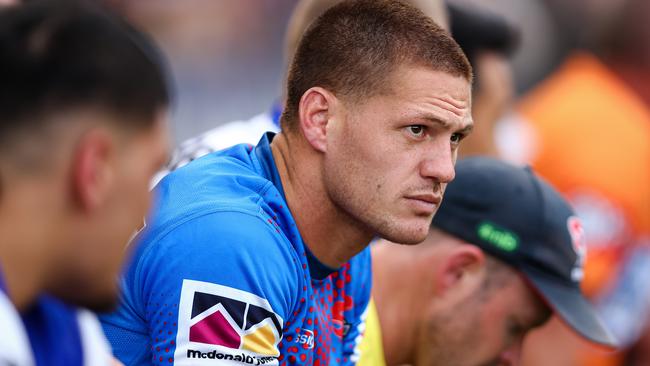
ARL Commission boss Peter V’landys has vowed to provide protection for Kalyn Ponga and hopes the Queensland Origin star doesn’t quit the sport as the NRL ramps up its fight against head-trauma injuries.
There are concerns Ponga could be forced into an early retirement after being concussed in last week’s win over the Tigers - his fourth major head knock in 10 months.
The NRL will today introduce a mandatory 11-day stand down period for players who suffer a concussion as the code explores every avenue to protect their elite.
Ponga is one of the biggest stars in the code, having only signed a five-year, $6 million extension with Newcastle last season, and V’landys wants the 24-year-old to enjoy another decade in the NRL.
“I am naturally worried about Kalyn and I don’t want to see him leave the game early,” V’landys said.
“The No.1 priority is the player and what’s best for Kalyn and this is the reason we are stepping-up our welfare measures with the stand-down period.
“Kalyn’s health and welfare is front and centre of our minds.
“We will await reports from doctors and see what their recommendations are.
“I am sure he will be getting the best treatment possible from the Knights.
“Kalyn is only young and naturally I don’t want him to quit the game. But it doesn’t matter who the player is and how good they are, their health to us will always come first.
“We are stepping up our research and we will explore the best people and the best methods to protect players against concussions.
“The stand-down period is one area and there are other options we are looking at as well, including saliva and blood testing for concussions.”
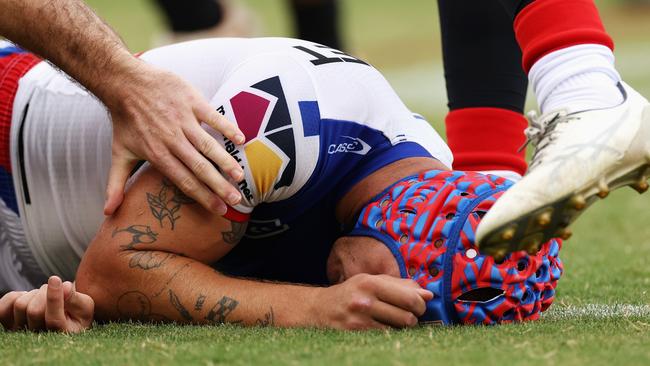
V’landys’ words come after the ARL Commission joined the AFL and world rugby in introducing a mandatory stand-down period for concussion which could see players sidelined for 11 days.
The commission reached the landmark decision on Tuesday night and informed NRL clubs of the new policy on Wednesday morning, having finalised months of research into whether to strengthen their concussion protocols by mandating a stand-down period for players who suffer serious head knocks.
Players who suffer a category one concussion will be automatically stood down a minimum of 11 days meaning they could miss two matches.
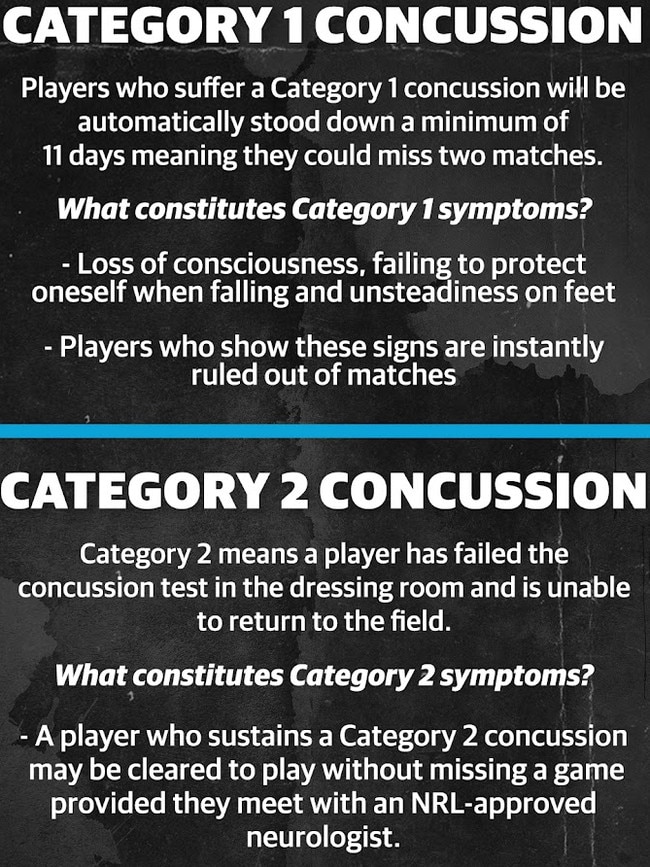
Category one symptoms include loss of consciousness, failing to protect oneself when falling and unsteadiness on feet. Players who show these signs are instantly ruled out of matches.
A category two means a player has failed the concussion test in the dressing room and is unable to return to the field.
The rule comes into place from the start of round three where the Sea Eagles take on Parramatta.
A player who sustains a category two concussion may be cleared to play without missing a game provided they meet with an NRL-approved neurologist.
The decision was made as the AFL found themselves at the centre of a class action involving more than 60 former players in the Supreme Court of Victoria.
The ARL Commission insists their review of concussion guidelines was motivated by a desire to increase protection for players rather than the threat of legal action.
Nevertheless, News Corp understands that the commission has also considered an individual concussion package for players that could entail individual pre-season testing and consistent testing throughout the season which may include saliva tests.
Blood testing could also come into play. It shapes as a defining decision for the game at a time when head knocks are once again under the spotlight following the latest setback suffered by Newcastle star Kalyn Ponga.
Ponga is set to spend time on the sidelines after suffering a concussion in the Knights’ round two win over the Wests Tigers, his fourth serious head knock in the past year.
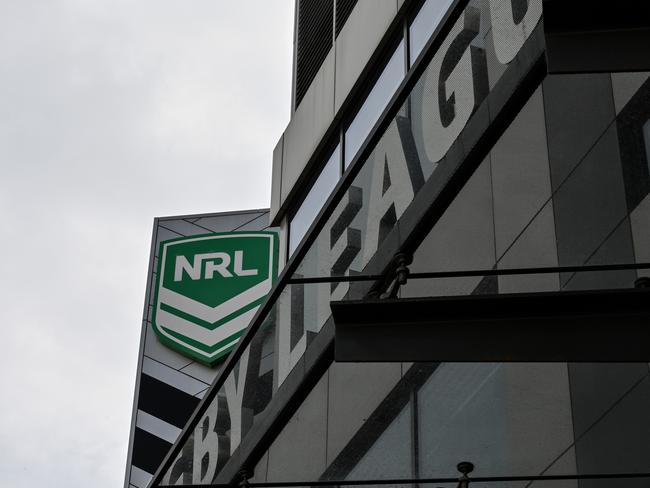
The NRL has also been forced to endure criticism over their use of an independent doctor in the bunker to monitor head knocks. Bulldogs head of football Phil Gould described the independent doctor as the greatest abomination in rugby league history but ARL Commission chair Peter V’landys and NRL chief executive Andrew Abdo vowed to stand their ground on the issue.
They have done just that by strengthening the protocols around protection of players who suffer head knocks.
KENT: KEY MEETING TO DECIDE PONGA’S FUTURE
- Paul Kent
Not for the first time Newcastle’s team list was sent to headquarters on a Tuesday afternoon without Kalyn Ponga in the line-up.
Ponga is fast becoming the sad lament of the NRL. A soft whistle, with strings playing lightly in the background.
Once the bright young wonder kid whose skills promised to bring fresh eyeballs to the game, Ponga is quickly emerging as the poster boy for concussion.
A What-Could-Have-Been, if the game was not so tough. Sunday he was gone within minutes, his fourth concussion in 10 months.
What the game plans to do about this remains to be seen.
So far, every measure brought in to deal with the concussion epidemic is a treatment for the symptom, not the cause.
A player gets a head knock, he goes for an assessment. He fails the assessment, he must stand down …
Ponga’s short-term outlook is that sometime on Thursday the Knights will sit down with the club doctor and try to map out his future.
“I’m not really sure where it is going to go,” Knights football director Peter Parr said on Tuesday.
“I know he isn’t playing this week and I know I’m catching up with the doctor on Thursday.
“I couldn’t even give you a guide on where it’s going, whether it be one week, two weeks, six weeks or three months.”
The good news is Ponga has been bright-eyed and brimmed with energy since getting knocked out.
Concussions affect everybody differently, every time, because of the peculiar chemistry of the brain.
Many emerge slow and foggy and struggling for motivation, a brain still in recovery.
That Ponga is bouncing is a huge plus.
Still, on Tuesday night the ARL Commission came up with a series of changes to further tighten safety around concussions that will be pushed to clubs on Wednesday.
Again, though, it is mostly a response to concussions already suffered.
At some point the game needs to find ways to prevent them.
It would have to be a long-term project, meaning there is a lot of pain ahead.
It took 20 years for the game to get here and it will take considerable time to unpeel whatever changes have led to here. And some things, it must be said, can’t be changed.
But what choice does the game have?
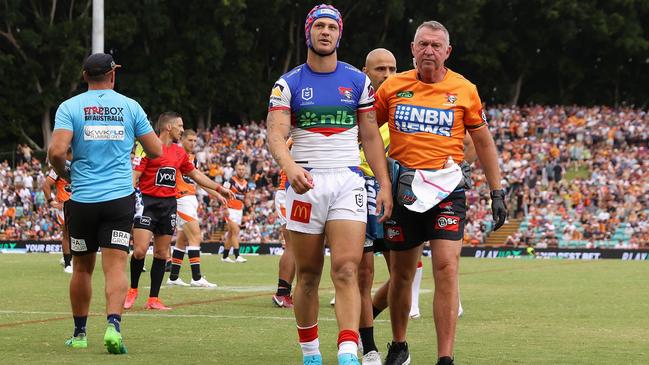
In physical terms, players have developed significantly in the past 20 years. Bigger, stronger and most significantly, perhaps, fitter.
I say that because one of the causes coaches point to when it comes to concussion is that the players remain fit and fast for basically most of the game. Danger is heightened right to the end.
In the past, the game began fast and remained like that for 20 minutes or so before it began to naturally slow down through fatigue.
Now, though, the players most susceptible to fatigue in that opening 20 minutes - the middle forwards — are replaced on interchange and the game pace barely slackens.
Their replacements play fit and fast until halftime, get a 15-minute breather, and then start the second half before the original middle returns to bring it home.
Some will argue that fatigue could bring more injuries, through tired technique, but it is worth exploring.
Should the interchange be reduced again?
What also has to be considered is at what point do coaches take responsibility?
All are coaching according to modern practice.
Understandably, coaches teach a tackle technique that is the best way to win the tackle, which wins the games, but which might not necessarily be the best technique in safety terms.
It is a professional game, after all, where success is measured in wins.
But the same tackle technique is being replicated down through juniors as well, all for a win that is gone in a week.
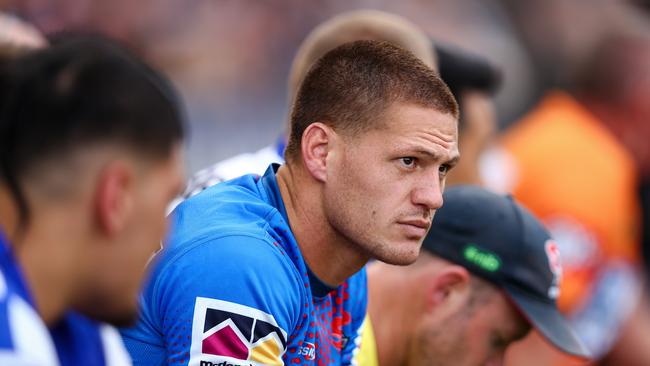
Coaches are the ones who could implement the greatest and quickest changes but it would need buy in from them all, and not one will start it based on trust the others will follow, so it won’t happen.
Why risk losing the tackle with safer technique if their opponents are not making the same changes?
The NRL is about to pair with academics who will sharpen their pencils and try to find trends that could possibly be the reason behind the upsurge in concussions as the game has got bigger, and more powerful, which would go beyond anecdotal evidence.
A four bell alarm should ring any time academics get involved with the game, so caution is the way forward. Each change will need to be pressure tested.
Many of today’s concussions are self-inflicted, for example, brought about by poor tackle technique from the defender or late footwork from the ball-runner that catches the tackler cold.
Meanwhile, Ponga remains sidelined, a star of the game dimmed a little today, hoping to find a way back, and the game remains a little less bright for it.




